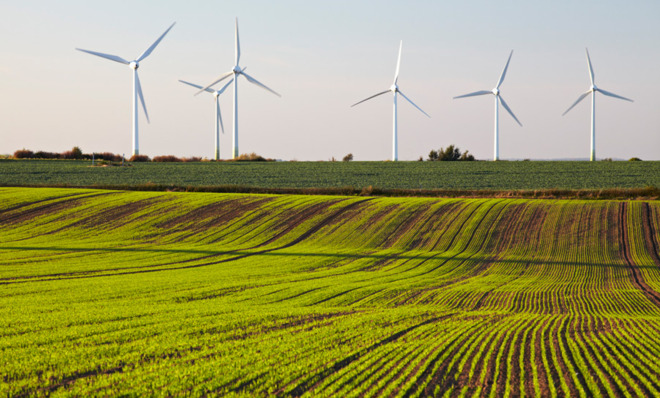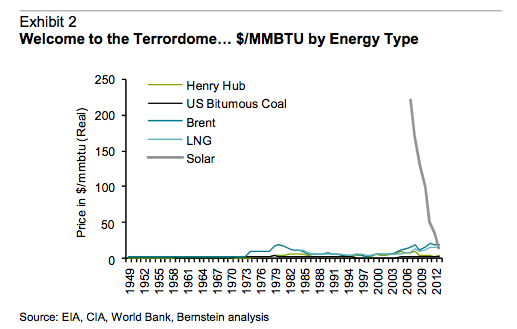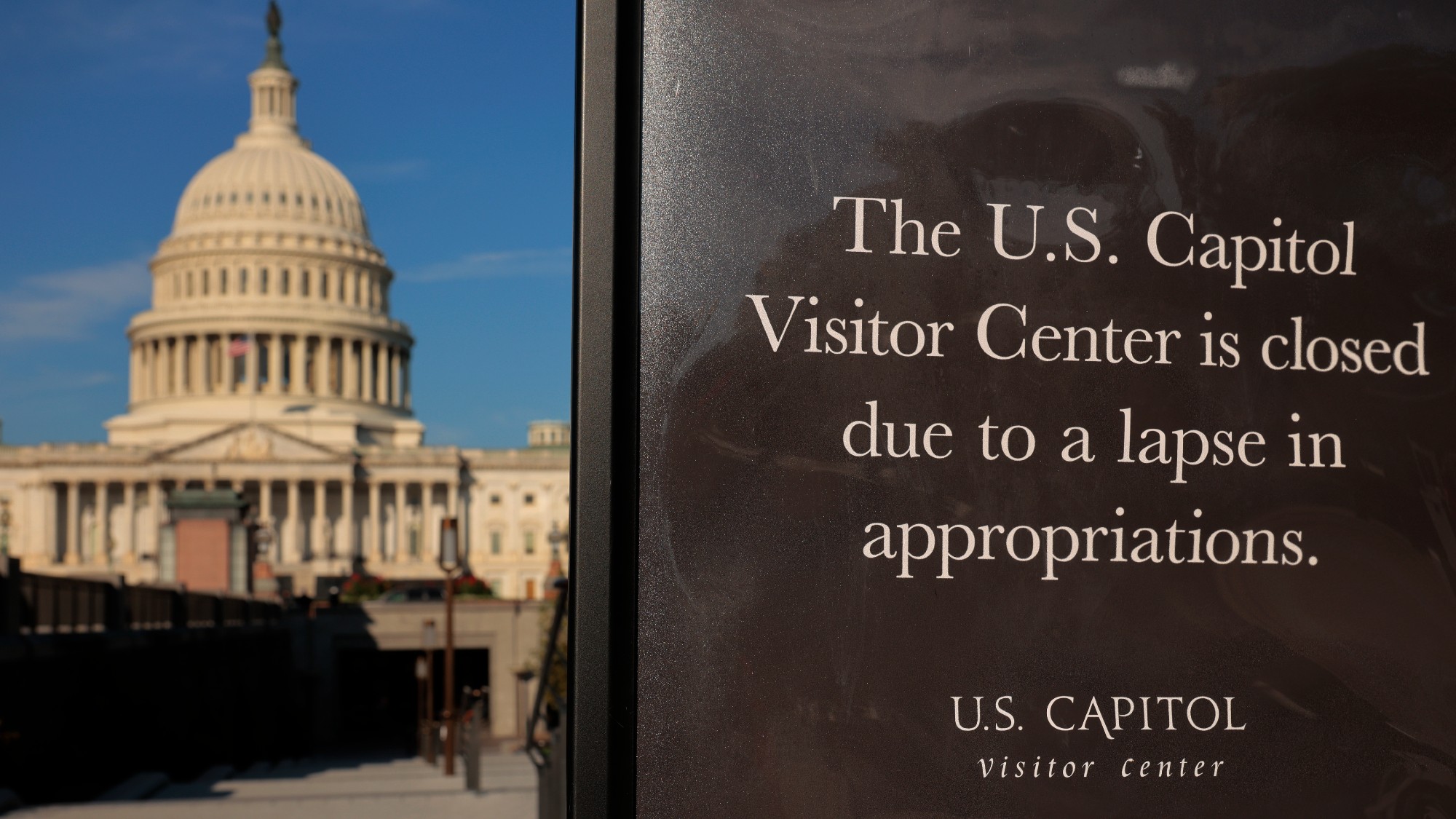The case for optimism on climate change
Things look bad, but they could change quickly


A very straightforward read of the science and the facts on climate change leads to the conclusion that the world is careening towards disaster. To stay under the international agreement of limiting warming to 2 degrees Celsius, we must peak our emissions very soon (as in, next year) and start cutting them drastically immediately after. It would be a worldwide effort on a par with the World War II mobilization, if not greater.
But we're not doing that. World emissions are rising, and fast. Thus Ezra Klein writes:
I'm a climate pessimist. I don't believe the United States — or the world — will do nearly enough, nearly fast enough, to hold the rise in temperatures to safe levels. I think we're fucked. Or, at the least, I think our grandchildren are fucked. [Vox]
I think Klein is being much too pessimistic. While Klein, and several other climate pessimists, are completely right on the facts, I think the conclusions they draw are too bleak. Meeting the internationally-agreed 2 degree warming limit may well be out of reach. But I believe very aggressive action on climate will happen fairly soon. Here's why.
The Week
Escape your echo chamber. Get the facts behind the news, plus analysis from multiple perspectives.

Sign up for The Week's Free Newsletters
From our morning news briefing to a weekly Good News Newsletter, get the best of The Week delivered directly to your inbox.
From our morning news briefing to a weekly Good News Newsletter, get the best of The Week delivered directly to your inbox.
First, I think climate change is the exception to how international relations normally go down.
Yes, it's quite easy to draw an international relations case, based on sound realist reasoning, that developing nations will never cut their emissions in time. This argument largely boils down to China and India since they are so huge; China alone now accounts for twice the total emissions of the United States. By this logic, no nation will harm its short-term interests by slashing emissions unilaterally when the gains are dispersed worldwide. "So far, when China has had to choose between economic growth and cutting its emissions, it usually chooses growth," writes Brad Plumer at Vox.
But I think what the pessimists haven't quite internalized is that China is going to be absolutely hammered by climate change. Think of it this way: they've got an area roughly the size of the United States, with more desert, less farmland, less water, and less raw materials. In that area they've got the population of the entire Western Hemisphere, plus Nigeria and Japan. China could easily blow through the world's carbon budget by itself; to say the Chinese government will choose growth over emissions is to say they will choose national self-immolation for a few measly decades of economic growth.
India has it even worse, and similar things hold for most developing nations. I think people underestimate how panicked these nations are going to be, and how serious the international pressure will be for a climate treaty in five to 10 years.
A free daily email with the biggest news stories of the day – and the best features from TheWeek.com
Second, technology. Despite the wretched new tariff on solar panels, the truth is that renewable technology is advancing like a mad beast. Wind prices are falling fast and investment is increasing steadily. Solar prices, meanwhile, are plummeting and investment is skyrocketing. Dig this chart, from the investment bank Sanford Bernstein:

Galloping renewables, plus nuclear (which only works with massive subsidies, but it does work) mean that a post-carbon future is increasingly plausible from technical and economic standpoints. There are credible models of near-total decarbonization, which may or may not pan out, but they become more believable with every passing quarter.
That brings me to the politics. Obviously American politics are a complete disaster on this issue, with one of two parties denying the issue altogether and the other without enough power to enact the necessary policy. There are many reasons for this, but a big one is that climate change got categorized as an environmental issue. As I've argued before, climate change is not about "saving the planet;" it's first and foremost about preserving human society (and the biosphere on which it depends). It really deserves its own A-list issue heading, but if we have to pick a traditional one, national security makes the most sense.
Thus witness the Tidewater folks in Virginia blearily realizing somebody is going to have to spend billions or their communities will be drowned. Or the government of Miami realizing that their entire city might be completely hosed.
And as Greg Sargent documents, Republican politicians are increasingly squirmy on this issue. They have presented themselves as tough-minded defenders of the American way of life against a bunch of dopey greens who would burn the economy to save a bunch of tadpoles — but what they really are is a bunch of Lysenkoist fools who are endangering the material security of the nation. With continuing drought, with every heatwave, with every catastrophic hurricane and storm surge, that reality will become ever more clear.
Yes, Klein is right that America's political institutions are basically a janky, poorly-designed mess, but that hasn't stopped us from taking aggressive action when the politics were right. When it became clear Hitler was a clear and present danger to the nation, suddenly all manner of crazy stuff was sensible — indeed, urgently necessary. It's not clear that the disasters will get worse fast enough to break through the political deadlock before the really bad stuff gets locked in, but I believe it's highly possible.
Because the one historical parallel to climate change — where political action has matched the urgency of the situation — is war.
Ryan Cooper is a national correspondent at TheWeek.com. His work has appeared in the Washington Monthly, The New Republic, and the Washington Post.
-
 The longest US government shutdown in history
The longest US government shutdown in historyIn The Spotlight Federal employees and low-income households have been particularly affected by ‘partisan standoffs’ in Washington
-
 Jeremy Hunt picks his favourite books
Jeremy Hunt picks his favourite booksThe Week Recommends The former chancellor shares works by Mishal Husain, Keach Hagey, and Johan Norberg
-
 Is the UAE fuelling the slaughter in Sudan?
Is the UAE fuelling the slaughter in Sudan?Today’s Big Question Gulf state is accused of supplying money and advanced Chinese weaponry to RSF militia behind massacres of civilians
-
 Has Zohran Mamdani shown the Democrats how to win again?
Has Zohran Mamdani shown the Democrats how to win again?Today’s Big Question New York City mayoral election touted as victory for left-wing populists but moderate centrist wins elsewhere present more complex path for Democratic Party
-
 Millions turn out for anti-Trump ‘No Kings’ rallies
Millions turn out for anti-Trump ‘No Kings’ ralliesSpeed Read An estimated 7 million people participated, 2 million more than at the first ‘No Kings’ protest in June
-
 Ghislaine Maxwell: angling for a Trump pardon
Ghislaine Maxwell: angling for a Trump pardonTalking Point Convicted sex trafficker's testimony could shed new light on president's links to Jeffrey Epstein
-
 The last words and final moments of 40 presidents
The last words and final moments of 40 presidentsThe Explainer Some are eloquent quotes worthy of the holders of the highest office in the nation, and others... aren't
-
 The JFK files: the truth at last?
The JFK files: the truth at last?In The Spotlight More than 64,000 previously classified documents relating the 1963 assassination of John F. Kennedy have been released by the Trump administration
-
 'Seriously, not literally': how should the world take Donald Trump?
'Seriously, not literally': how should the world take Donald Trump?Today's big question White House rhetoric and reality look likely to become increasingly blurred
-
 Will Trump's 'madman' strategy pay off?
Will Trump's 'madman' strategy pay off?Today's Big Question Incoming US president likes to seem unpredictable but, this time round, world leaders could be wise to his playbook
-
 Democrats vs. Republicans: who are US billionaires backing?
Democrats vs. Republicans: who are US billionaires backing?The Explainer Younger tech titans join 'boys' club throwing money and support' behind President Trump, while older plutocrats quietly rebuke new administration
